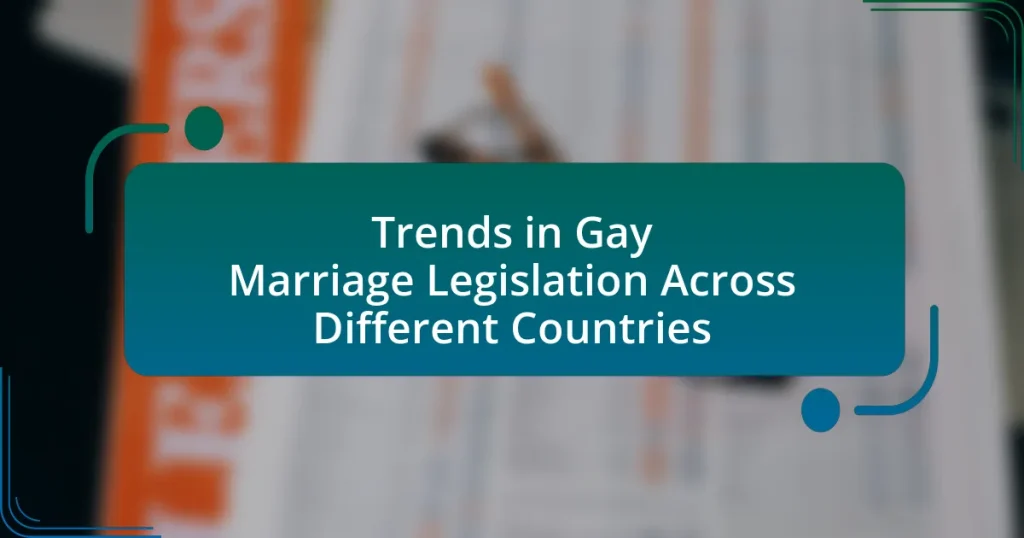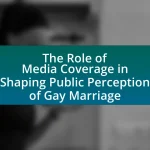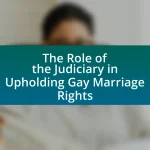The article examines current trends in gay marriage legislation across various countries, highlighting the global movement towards legalization and recognition of same-sex marriages, with over 30 countries having legalized it by 2023. It discusses the evolution of attitudes towards gay marriage, influenced by historical events, cultural factors, and political climates. Key milestones in legalization, the differing legal frameworks, and the challenges faced in enacting legislation are analyzed. The implications of gay marriage legislation on society, including its effects on LGBTQ+ rights, public opinion, and economic impacts, are also explored, alongside future trends and the role of advocacy in promoting marriage equality.
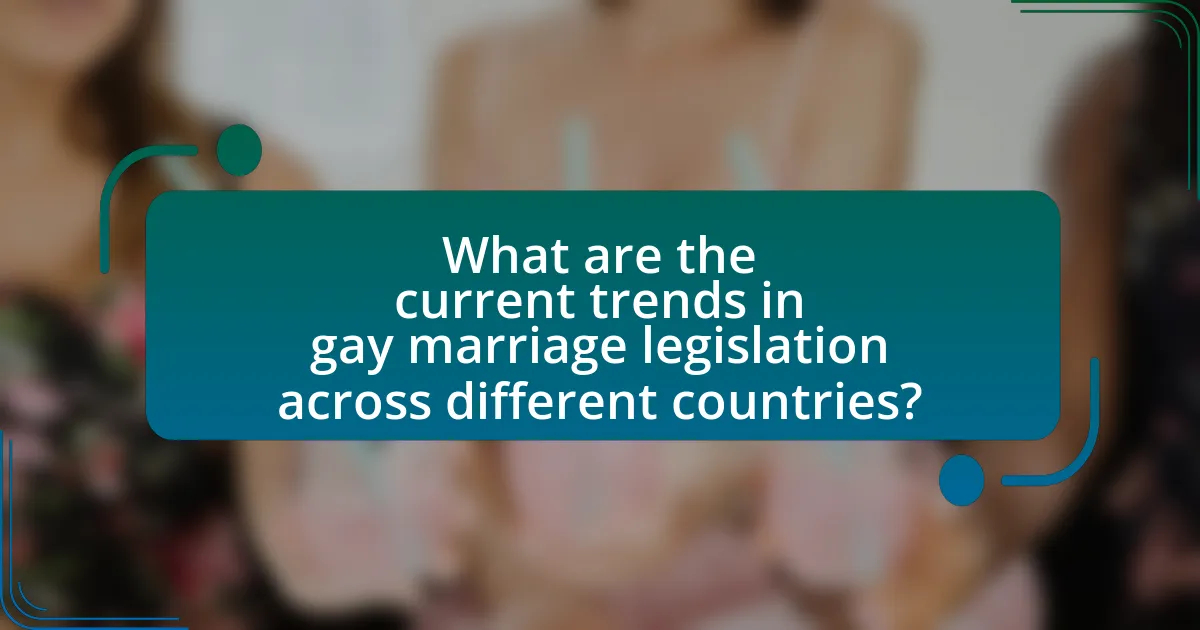
What are the current trends in gay marriage legislation across different countries?
Current trends in gay marriage legislation show a global movement towards legalization and recognition of same-sex marriages, with over 30 countries having legalized it as of 2023. Notable examples include countries like Germany, which legalized same-sex marriage in 2017, and Taiwan, which became the first Asian nation to do so in 2019. Additionally, countries such as Mexico and the United States have seen significant progress, with various states and regions recognizing same-sex marriages despite federal variations. This trend reflects a broader societal acceptance and legal acknowledgment of LGBTQ+ rights, driven by advocacy and changing public opinion.
How have attitudes towards gay marriage evolved globally?
Attitudes towards gay marriage have evolved significantly globally, with increasing acceptance and legalization in many countries. Initially, same-sex marriage was largely opposed, with only a few nations recognizing it, such as the Netherlands in 2001. Over the past two decades, numerous countries, including the United States in 2015 and Germany in 2017, have legalized gay marriage, reflecting a shift in public opinion towards greater acceptance. Surveys indicate that support for same-sex marriage has risen dramatically; for instance, a 2021 Pew Research Center study found that support among Americans increased from 27% in 1996 to 70% in 2021. This trend is mirrored in various regions, with many countries in Europe, Latin America, and parts of Asia embracing legal recognition for same-sex couples, showcasing a broader global movement towards equality and human rights.
What historical events have influenced gay marriage legislation?
The historical events that have influenced gay marriage legislation include the Stonewall Riots of 1969, which marked a significant turning point in the LGBTQ+ rights movement, leading to increased activism and visibility. The AIDS crisis in the 1980s further galvanized the community and highlighted the need for legal recognition and rights, including marriage. Additionally, the Massachusetts Supreme Judicial Court’s ruling in 2003, which legalized same-sex marriage, set a precedent that influenced other states and countries. The Obergefell v. Hodges decision in 2015 by the U.S. Supreme Court, which legalized same-sex marriage nationwide, also played a crucial role in shaping global perspectives on marriage equality. These events collectively contributed to the evolving legal landscape surrounding gay marriage.
How do cultural factors impact the acceptance of gay marriage?
Cultural factors significantly impact the acceptance of gay marriage by shaping societal attitudes, beliefs, and norms regarding sexual orientation and relationships. For instance, in countries with strong religious influences, such as many in the Middle East and parts of Africa, cultural norms often oppose gay marriage, leading to lower acceptance rates. Conversely, in more liberal societies, like those in Western Europe and North America, cultural acceptance of LGBTQ+ rights has increased, resulting in legal recognition of gay marriage in numerous jurisdictions. Research by Pew Research Center in 2020 indicates that acceptance of gay marriage is higher in countries where individualism and secularism are prevalent, highlighting the correlation between cultural values and legal recognition of same-sex unions.
Which countries have legalized gay marriage, and what are the timelines?
As of October 2023, 34 countries have legalized gay marriage. The first country to do so was the Netherlands in 2001, followed by Belgium in 2003, Canada in 2005, Spain in 2005, and South Africa in 2006. Other notable countries include Argentina in 2010, Portugal in 2010, Iceland in 2010, and Uruguay in 2013. The United States legalized gay marriage nationwide in 2015 through the Supreme Court ruling in Obergefell v. Hodges. More recently, countries like Taiwan legalized same-sex marriage in 2019, and Chile followed suit in 2022. Each of these legalizations reflects significant societal and legal changes within their respective nations.
What are the key milestones in the legalization of gay marriage in various countries?
The key milestones in the legalization of gay marriage across various countries include several landmark events. In 2001, the Netherlands became the first country to legalize same-sex marriage, setting a precedent for others. In 2003, Massachusetts became the first U.S. state to legalize gay marriage, influencing subsequent state laws. In 2015, the U.S. Supreme Court ruled in Obergefell v. Hodges, legalizing same-sex marriage nationwide. In 2017, Germany passed a law allowing same-sex marriage, following a significant public debate. In 2019, Taiwan became the first Asian country to legalize gay marriage, marking a significant milestone in the region. These events reflect a broader trend toward acceptance and legal recognition of same-sex relationships globally.
How do the legal frameworks differ between countries that have legalized gay marriage?
Legal frameworks for gay marriage vary significantly between countries that have legalized it, reflecting differences in cultural, religious, and political contexts. For instance, in the Netherlands, the first country to legalize gay marriage in 2001, the law grants same-sex couples the same rights as heterosexual couples, including adoption rights. In contrast, countries like Germany, which legalized gay marriage in 2017, initially allowed civil partnerships that provided limited rights compared to marriage, highlighting a gradual evolution in legal recognition. Additionally, some countries, such as Spain, have integrated anti-discrimination laws alongside marriage equality, ensuring broader protections for LGBTQ+ individuals. These variations illustrate how legal frameworks are shaped by each country’s unique societal values and historical developments regarding LGBTQ+ rights.
What challenges do countries face in enacting gay marriage legislation?
Countries face significant challenges in enacting gay marriage legislation, primarily due to cultural, religious, and political opposition. Cultural attitudes towards homosexuality often reflect deep-seated beliefs that can hinder legislative progress; for instance, in many countries, traditional views on marriage as a union between a man and a woman prevail. Religious institutions frequently oppose gay marriage, influencing public opinion and political decisions, as seen in nations where religious leaders hold substantial sway over governance. Additionally, political factors, such as the fear of losing electoral support from conservative constituents, can deter lawmakers from pursuing or supporting gay marriage initiatives. For example, in countries like Poland and Hungary, political leaders have leveraged anti-LGBTQ+ sentiments to consolidate power, further complicating the legislative landscape. These intertwined challenges create a complex environment that impedes the advancement of gay marriage rights.
What legal obstacles hinder the progress of gay marriage legislation?
Legal obstacles that hinder the progress of gay marriage legislation include constitutional bans, lack of political support, and discriminatory laws. Constitutional bans exist in several countries, where amendments explicitly define marriage as between a man and a woman, preventing any legal recognition of same-sex unions. For example, in the United States, many states had enacted such bans prior to the Supreme Court’s decision in Obergefell v. Hodges in 2015, which legalized same-sex marriage nationwide. Additionally, lack of political support from lawmakers can stall legislative efforts, as seen in countries where conservative parties hold significant power and oppose gay marriage. Discriminatory laws, such as those that criminalize homosexuality, further complicate the legal landscape, making it difficult for advocates to push for marriage equality. These factors collectively create a challenging environment for the advancement of gay marriage legislation.
How do political climates affect the push for gay marriage rights?
Political climates significantly influence the push for gay marriage rights by shaping public opinion, legislative agendas, and judicial outcomes. In countries with progressive political environments, such as Canada and the Netherlands, supportive governments have enacted laws that legalize same-sex marriage, reflecting a broader societal acceptance. Conversely, in nations with conservative political climates, such as Russia and many Middle Eastern countries, anti-LGBTQ+ sentiments are often institutionalized, leading to legal restrictions and social stigma against same-sex relationships. For instance, the U.S. Supreme Court’s 2015 decision in Obergefell v. Hodges, which legalized same-sex marriage nationwide, was facilitated by a political climate that had shifted towards greater acceptance of LGBTQ+ rights, influenced by advocacy and changing public attitudes.
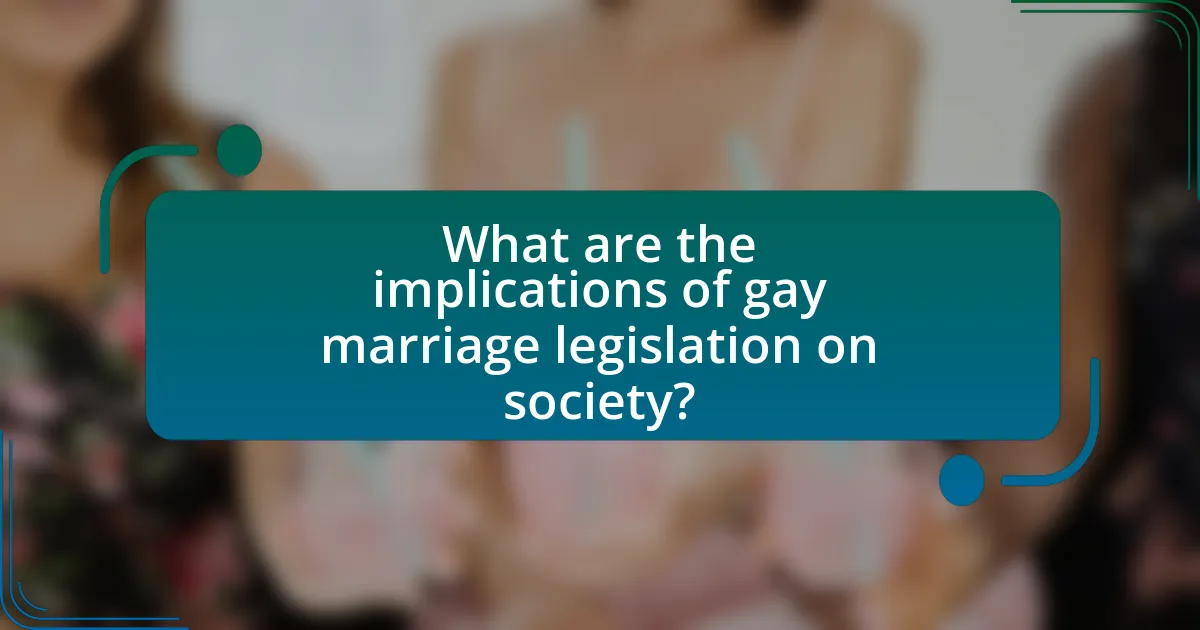
What are the implications of gay marriage legislation on society?
Gay marriage legislation has significant implications on society, primarily promoting equality and social acceptance. Legalizing same-sex marriage fosters a more inclusive environment, reducing stigma and discrimination against LGBTQ+ individuals. Studies, such as those published in the American Journal of Public Health, indicate that regions with legalized gay marriage experience lower rates of mental health issues among LGBTQ+ populations, highlighting the positive societal impact of such legislation. Furthermore, legal recognition of same-sex marriages contributes to economic benefits, as seen in states like Massachusetts, where the legalization of gay marriage led to increased wedding-related spending and tourism.
How does legalizing gay marriage affect LGBTQ+ rights?
Legalizing gay marriage significantly enhances LGBTQ+ rights by providing legal recognition and protection to same-sex couples. This legal recognition allows same-sex couples to access the same rights and benefits as heterosexual couples, including tax benefits, inheritance rights, and healthcare decision-making. For instance, after the legalization of gay marriage in the United States in 2015, studies indicated an increase in mental health and well-being among LGBTQ+ individuals, as they experienced reduced stigma and discrimination. Furthermore, legalizing gay marriage often leads to broader societal acceptance of LGBTQ+ individuals, fostering an environment where additional rights, such as anti-discrimination protections, are more likely to be pursued and enacted.
What are the social benefits of recognizing gay marriage?
Recognizing gay marriage provides significant social benefits, including enhanced social acceptance and reduced stigma for LGBTQ+ individuals. Studies show that legal recognition of same-sex marriage correlates with increased mental health and well-being among LGBTQ+ populations, as evidenced by research from the American Psychological Association, which found that legalizing gay marriage leads to lower rates of depression and anxiety in these communities. Furthermore, recognizing gay marriage fosters stronger family structures, as it allows same-sex couples to access legal protections and benefits, contributing to overall societal stability.
How does gay marriage legislation influence public opinion on LGBTQ+ issues?
Gay marriage legislation positively influences public opinion on LGBTQ+ issues by increasing acceptance and support for the community. Research indicates that as countries legalize same-sex marriage, public attitudes toward LGBTQ+ individuals become more favorable; for instance, a study by Pew Research Center in 2019 found that support for same-sex marriage was correlated with broader acceptance of LGBTQ+ rights in various nations. This shift occurs because legal recognition of same-sex relationships often leads to greater visibility and normalization of LGBTQ+ identities, fostering a more inclusive societal environment.
What economic impacts arise from the legalization of gay marriage?
The legalization of gay marriage leads to significant economic impacts, including increased consumer spending, enhanced tax revenues, and growth in various sectors such as wedding services and tourism. Studies indicate that states in the U.S. that legalized gay marriage experienced a boost in wedding-related expenditures, with estimates suggesting an increase of approximately $100 million in wedding spending in the first year alone. Additionally, the Williams Institute reported that legalizing same-sex marriage could generate up to $1 billion in tax revenue over three years due to increased marriage licenses and related economic activities. These economic benefits demonstrate that the legalization of gay marriage not only promotes equality but also contributes positively to the economy.
How does gay marriage contribute to local economies?
Gay marriage contributes to local economies by increasing spending in various sectors, particularly in hospitality, retail, and services. When same-sex couples marry, they often spend on weddings, which can include venue rentals, catering, photography, and attire, leading to a boost in local businesses. A study by the Williams Institute found that legalizing same-sex marriage in the United States resulted in an estimated $2.5 billion in economic activity from weddings and related spending. Additionally, increased tourism can occur as couples travel to jurisdictions where gay marriage is legal, further benefiting local economies through hotel stays, dining, and entertainment.
What are the financial implications for businesses in countries with legalized gay marriage?
Legalized gay marriage positively impacts businesses in countries by expanding the customer base and increasing revenue opportunities. Studies indicate that businesses in these regions experience higher sales due to increased spending from LGBTQ+ couples who can now legally marry. For instance, a report by the Williams Institute found that legalizing same-sex marriage in the U.S. led to an estimated economic boost of $2.6 billion in the first year alone, driven by wedding-related expenditures. Additionally, businesses that support LGBTQ+ rights often see enhanced brand loyalty and employee satisfaction, which can lead to lower turnover rates and higher productivity.
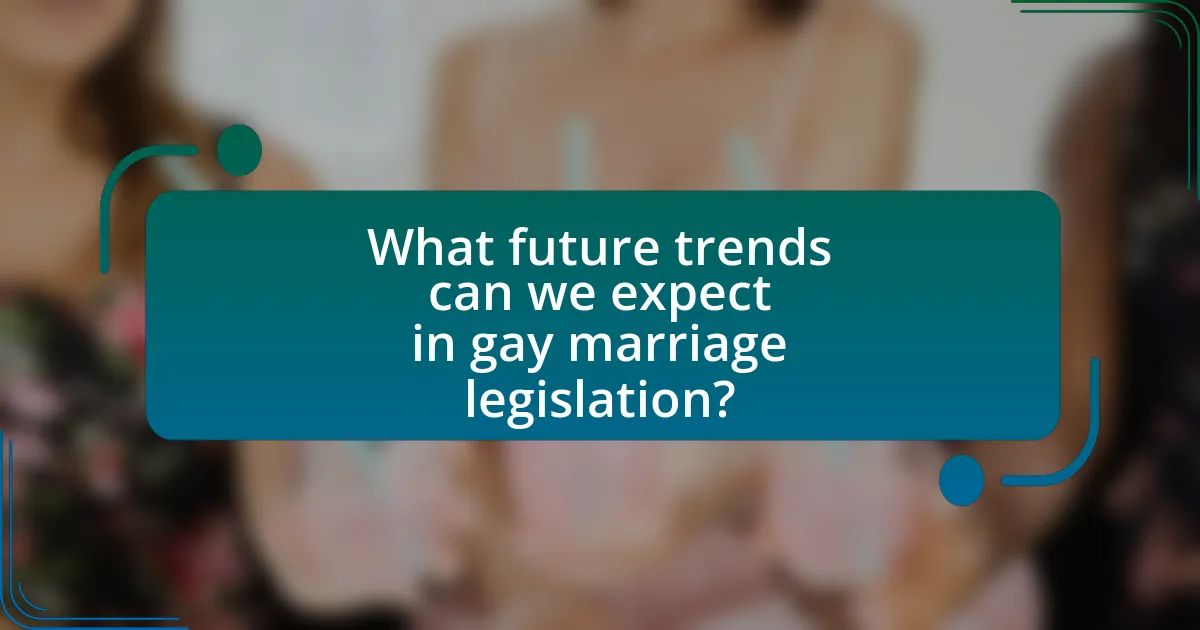
What future trends can we expect in gay marriage legislation?
Future trends in gay marriage legislation indicate a continued global movement towards legalization and recognition of same-sex marriages. As of 2023, numerous countries have either legalized gay marriage or are in the process of considering legislation, reflecting a shift in societal attitudes and legal frameworks. For instance, countries like Taiwan and Chile have made significant strides in recent years, with Taiwan being the first in Asia to legalize same-sex marriage in 2019, and Chile following suit in 2022. Additionally, ongoing advocacy and legal challenges in various regions suggest that more nations may adopt similar measures, influenced by international human rights standards and public support for LGBTQ+ rights. This trend is supported by increasing acceptance of LGBTQ+ individuals in many societies, as evidenced by surveys showing rising approval rates for same-sex marriage globally.
How might international pressure influence countries without gay marriage laws?
International pressure can significantly influence countries without gay marriage laws by prompting legislative changes through diplomatic, economic, and social channels. For instance, countries may face sanctions or reduced foreign aid from nations advocating for LGBTQ+ rights, which can incentivize them to reconsider their stances on gay marriage. Additionally, international organizations, such as the United Nations, often promote human rights standards that include marriage equality, pressuring governments to align with these norms to maintain their global standing. Historical examples include the shift in public policy in countries like Ireland and Taiwan, where international advocacy and pressure contributed to the legalization of same-sex marriage.
What role do global organizations play in advocating for gay marriage rights?
Global organizations play a crucial role in advocating for gay marriage rights by promoting equality and human rights on an international scale. These organizations, such as the United Nations and Human Rights Campaign, engage in lobbying efforts, provide resources for legal reform, and raise awareness about the importance of marriage equality. For instance, the UN has recognized the right to marry as a fundamental human right, influencing member states to consider legalizing same-sex marriage. Additionally, global organizations often collaborate with local activists to support legislative changes, as seen in countries like Ireland, where international advocacy contributed to the successful legalization of gay marriage in 2015.
How can social movements impact future legislation on gay marriage?
Social movements can significantly influence future legislation on gay marriage by raising public awareness, mobilizing support, and pressuring lawmakers to enact change. For instance, the advocacy efforts of organizations like the Human Rights Campaign and grassroots movements have led to increased visibility of LGBTQ+ issues, resulting in shifts in public opinion. According to a 2020 Gallup poll, 67% of Americans supported same-sex marriage, a dramatic increase from 27% in 1996. This change in public sentiment often compels legislators to align their policies with the views of their constituents, leading to the introduction and passage of pro-gay marriage laws. Additionally, successful legal challenges, such as Obergefell v. Hodges in the United States, demonstrate how social movements can achieve legislative outcomes through judicial avenues, further solidifying the impact of organized advocacy on future legislation.
What strategies can advocates use to promote gay marriage legislation?
Advocates can promote gay marriage legislation through grassroots mobilization, public awareness campaigns, and strategic lobbying. Grassroots mobilization involves organizing community events and rallies to build support and demonstrate public demand for marriage equality. Public awareness campaigns utilize social media, advertisements, and educational programs to inform the public about the benefits of gay marriage and counteract misinformation. Strategic lobbying includes engaging with lawmakers, providing them with data on public support, and sharing personal stories to humanize the issue. For instance, a 2020 Gallup poll indicated that 67% of Americans support same-sex marriage, highlighting the importance of public sentiment in legislative advocacy.
What are effective methods for raising awareness about gay marriage rights?
Effective methods for raising awareness about gay marriage rights include utilizing social media campaigns, organizing community events, and collaborating with influential public figures. Social media platforms like Twitter and Instagram have proven effective, as they allow for rapid dissemination of information and engagement with a broad audience; for instance, the #LoveIsLove campaign significantly increased visibility for LGBTQ+ rights. Community events, such as pride parades and educational workshops, foster direct engagement and provide a platform for sharing personal stories, which can humanize the issue and encourage empathy. Collaborating with public figures, such as celebrities or politicians who support gay marriage, can amplify the message and reach diverse demographics, as seen when prominent figures publicly endorsed marriage equality during legislative debates. These methods collectively contribute to a more informed public and promote advocacy for gay marriage rights.
How can grassroots movements influence legislative change?
Grassroots movements can influence legislative change by mobilizing public support, raising awareness, and applying pressure on lawmakers. For instance, the marriage equality movement in the United States effectively utilized grassroots organizing to shift public opinion, which ultimately led to the Supreme Court’s decision in Obergefell v. Hodges in 2015, legalizing same-sex marriage nationwide. This movement engaged communities through protests, social media campaigns, and local advocacy, demonstrating that sustained grassroots efforts can create significant political momentum and lead to legislative reforms.
What resources are available for understanding gay marriage legislation?
Comprehensive resources for understanding gay marriage legislation include legal databases, government websites, academic journals, and advocacy organization publications. Legal databases such as Westlaw and LexisNexis provide access to case law and statutes related to gay marriage. Government websites, like those of the U.S. Supreme Court and various state legislatures, offer official documents and rulings, including the landmark Obergefell v. Hodges decision that legalized same-sex marriage nationwide in 2015. Academic journals, such as the Journal of Homosexuality, publish peer-reviewed articles analyzing the implications and trends of gay marriage legislation. Additionally, organizations like the Human Rights Campaign and the Williams Institute provide research reports and policy analyses that highlight legislative changes and societal impacts across different countries.
Where can individuals find reliable information on gay marriage laws worldwide?
Individuals can find reliable information on gay marriage laws worldwide through reputable organizations and government resources. For instance, the International Lesbian, Gay, Bisexual, Trans and Intersex Association (ILGA) provides comprehensive reports and updates on the legal status of same-sex marriage in various countries. Additionally, government websites, such as those of national legislatures or ministries of justice, often publish official legal texts and updates regarding marriage laws. Furthermore, academic research articles and legal databases, such as Westlaw or LexisNexis, offer detailed analyses and case law related to gay marriage legislation, ensuring that individuals access accurate and up-to-date information.
What organizations provide support for LGBTQ+ rights and advocacy?
Organizations that provide support for LGBTQ+ rights and advocacy include the Human Rights Campaign, GLAAD, the Trevor Project, and the International Lesbian, Gay, Bisexual, Trans and Intersex Association (ILGA). The Human Rights Campaign is the largest LGBTQ+ advocacy group in the United States, focusing on policy advocacy and public education. GLAAD works to promote fair and accurate representation of LGBTQ+ individuals in media. The Trevor Project offers crisis intervention and suicide prevention services to LGBTQ+ youth. ILGA is a worldwide federation advocating for LGBTQ+ rights and equality across various countries. These organizations play crucial roles in advancing LGBTQ+ rights and influencing legislation related to gay marriage and broader equality issues.
